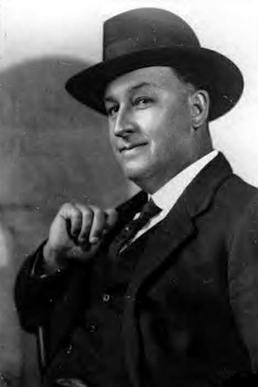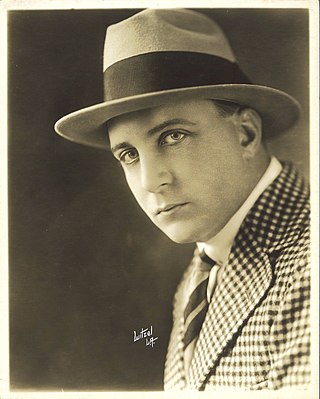
William Joseph Lincoln was an Australian playwright, theatre manager, film director and screenwriter in the silent era. He produced, directed and/or wrote 23 films between 1911 and 1916.

John F. Gavin was a pioneer Australian film actor and director, one of the early filmmakers of the 1910s. He is best known for making films about bushrangers such as Captain Thunderbolt, Captain Moonlite, Ben Hall and Frank Gardiner. Known informally as 'Jack', Gavin worked in collaboration with his wife Agnes, who scripted many of his films.

Raymond Longford was a prolific Australian film director, writer, producer, and actor during the silent era. Longford was a major director of the silent film era of the Australian cinema. He formed a production team with Lottie Lyell. His contributions to Australian cinema with his ongoing collaborations with Lyell, including The Sentimental Bloke (1919) and The Blue Mountains Mystery (1921), prompted the Australian Film Institute's AFI Raymond Longford Award, inaugurated in 1968, to be named in his honour.

Arthur Shirley was an Australian actor, writer, producer, and director of theatre and film. He experienced some success as a film actor in Hollywood between 1914 and 1920.
Assigned to his Wife is a 1911 Australian silent film from director John Gavin. It is a convict-era "military romantic melodrama".
The Gentleman Bushranger is a 1921 Australian film melodrama from director Beaumont Smith. Bushranging films were banned at the time but Smith got around this by making the plot about a man falsely accused of being a bushranger.
Sweet Nell of Old Drury is a 1911 Australian silent film directed by Raymond Longford starring Nellie Stewart about the relationship between Nell Gwynne and King Charles II. It is based on the 1900 play of the same name by Paul Kester which Stewart had performed numerous times on stage. It is considered a lost film.

Alfred Rolfe, real name Alfred Roker, was an Australian stage and film director and actor, best known for being the son-in-law of the celebrated actor-manager Alfred Dampier, with whom he appeared frequently on stage, and for his prolific output as a director during Australia's silent era, including Captain Midnight, the Bush King (1911), Captain Starlight, or Gentleman of the Road (1911) and The Hero of the Dardanelles (1915). Only one of his films as director survives today.
Walter Franklyn Barrett, better known as Franklyn Barrett, was an Australian film director and cinematographer. He worked for a number of years for West's Pictures. It was later written of the filmmaker that "Barrett's visual ingenuity was to be the highlight of all his work, but... his direction of actors was less assured".

Captain Midnight, the Bush King is a 1911 Australian silent Western film about the fictitious bushranger Captain Midnight. It was the directorial debut of actor Alfred Rolfe. The film is based on the play of same name by W. J. Lincoln and Alfred Dampier. Captain Midnight, the Bush King is now considered lost.
The Life of Rufus Dawes is a 1911 Australian silent film based on Alfred Dampier's stage adaptation of the 1874 novel For the Term of His Natural Life produced by Charles Cozens Spencer.
The Cup Winner is a 1911 Australian silent film directed by Alfred Rolfe. It is set against a backdrop of horseracing and the finale involves real footage from the 1911 Melbourne Cup.
Caloola, or The Adventures of a Jackeroo is a 1911 Australian silent film directed by Alfred Rolfe based on a novel published the previous year by Clement Pratt.
Cooee and the Echo is a 1912 Australian silent film directed by Alfred Rolfe. It is considered a lost film.
The Cheat is a 1912 Australian silent film directed by Alfred Rolfe. It is considered a lost film.
Moira, or The Mystery of the Bush is a 1912 Australian silent film directed by Alfred Rolfe.
Charles Villiers was an Australian actor and occasional director who appeared in many silent films. According to a contemporary report, "there is probably no actor in Australia that has done more consistent picture work than Mr. Villiers, both as heavy lead, and director." He was particularly well known for playing villains.
A Tale of the Australian Bush is a 1911 Australian silent film directed by Gaston Mervale. Set in colonial Australia, it was also known as Ben Hall, the Notorious Bushranger and is considered a lost film.

Dan Morgan is a 1911 Australian film from Charles Cozens Spencer about the bushranger Daniel Morgan. It was said to be starring "Alfred Rolfe and company". Rolfe directed three movies for Spencer, all starring himself and his wife Lily Dampier so there is a chance he may have directed this one and that it starred his wife. A prospectus for the Australian Photo Play Company said he directed it. It is considered a lost film.
The Australian Photo-Play Company was a short-lived but highly productive Australian film production company which operated from 1911 to 1912.






